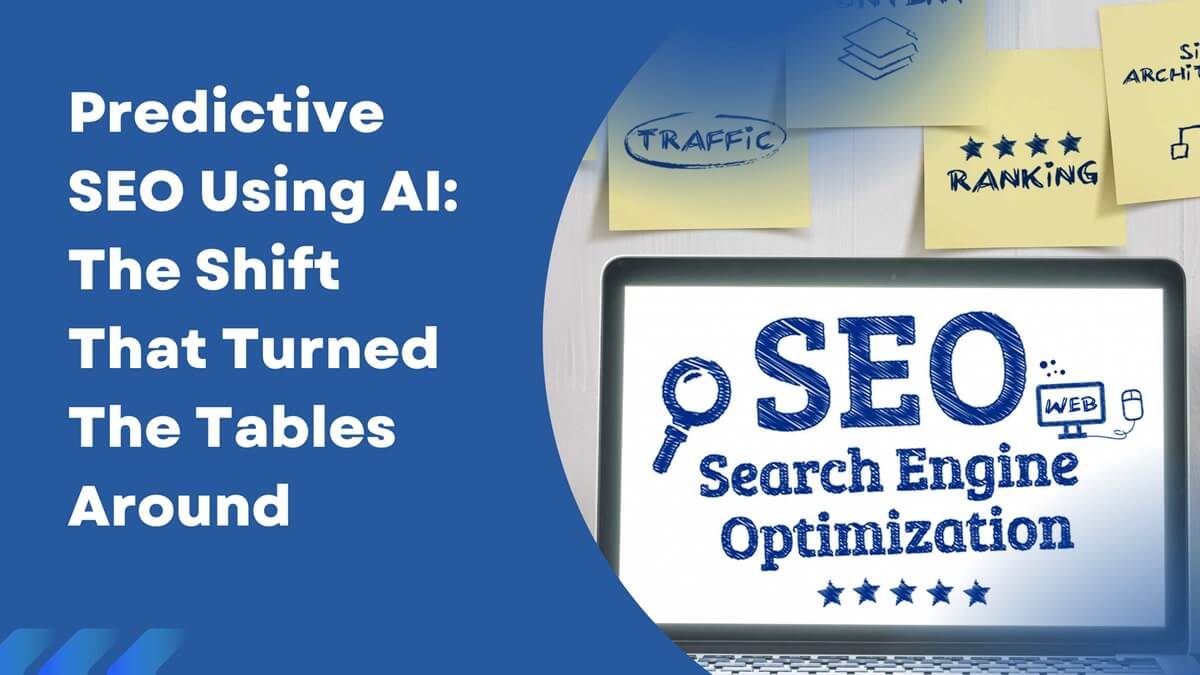Have you ever wished to find out how artificial intelligence could change the game in your SEO strategy?
Predictive SEO uses AI and its capacity for predicting user behaviour and trend forecasting, which means marketers are better placed than ever to position themselves ahead of the curve. This can be done by analyzing a large volume of data so that predictive AI can offer possible benefits regarding content strategy and usage of keywords, among other search visibility benefits. Whether you are an in-house SEO specialist or someone looking to outsource search engine optimization services, you should know about this shift.
In this article, we will discuss the basics of predictive AI, its application in the field of SEO, and how many tools can be deployed to maximize your digital marketing.
What Is Predictive AI?
Predictive AI is the application of artificial intelligence to forecast future trends, behaviour, and outcomes that can be predicted based on historical data. In a way, predictive AI allows marketers to make smart decisions related to their SEO strategies by analyzing patterns in user behaviour, search queries, and market dynamics.
For instance, a travel portal can use predictive AI to analyze patterns of past searches, recognize that “eco-friendly travelling” is an emerging query, and then optimize the content likewise. The portal can prepare itself to attract organic traffic based on the new trend before competitors catch up.
Predictive AI vs. Generative AI
Predictive AI is about what is going to happen with the data that is out, whereas generative AI is about something that doesn’t exist yet, briefly creating and inventing. Predictive AI will find the likely keywords, user queries, and forms of content that are going to perform well in the future, while generative AI will most likely help in the writing of blog posts or even social media messages.
If marketers know the difference between them, they can apply both to the best of their ability, using predictive to inform generative strategies of what kind of content to create.
Predictive AI in SEO

The use of predictive AI will greatly improve the performance of SEO strategies. Predictive AI can sense emerging trends in search before they boom. This will make it possible for marketers to optimize their content about these trends, thereby giving them a great probability of ranking higher in the search engines.
Following are some benefits marketers can enjoy
ChatGPT Or Copilot: Which One Performs Best in Predictive AI?
While selecting any tool from the vast pantry of AI available on the web, you must consider their respective predictive capabilities. For example, ChatGPT is a great tool if you want to generate content in seconds, while Copilot, previously known as Bing AI, provides statistics to boost the effectiveness of keywords and others, making your SEO journey data-oriented. The best depends on what is needed and the kind of predictive analysis required.
ChatGPT

ChatGPT is a natural language processing model which can soon become a superpower tool for content generation. The strengths appear to be found within readable text produced from the input that it receives. For predictive SEO, it will produce outlines, suggest keywords and even generate meta descriptions. It’s not a dedicated predictive tool. However, it requires man-in-the-loop input to guide its capabilities effectively.
✔ Craft SEO Strategies- Right from creative content ideation to technical keyword research, it can be a great resource to leverage. It also helps find LSI (latent search indexing) keywords to keep your content relevant and qualified.
✔ Generate High-Quality Content—However, it lacks awareness about events beyond 2021, but effective prompts and an outline can push it to create content internet surfers want to read.
✔ Boost Local SEO—Unexpected, right? However, ChatGPt, with its generative and analytical capabilities, can analyze the latest local trends and user behaviour. Using this, you can create location-specific content and outreach emails.
Copilot (Bing AI)
Bing AI integration with data-driven information supports keyword planning. Its ability to analyze current search trends gives users an advantage when it comes to understanding current user interests, making it valuable for marketers looking to capitalize on emerging topics.
Below are the top 3 uses of Copilot AI-
✔ Competitive Analysis- Copilot’s advanced data engineering can help you analyze the SEO strategies used by your competitors. Just provide AI with a list of top-ranking websites in your niche, and it will reveal the keywords and topics they are targeting.
✔ Query Suggestions- It can act as your buddy if you feel a technical block midway. Simply leverage Copilot to brainstorm new ideas, keywords and long-tail keywords. This will not just help you with SEO but also expand your content coverage.
✔ Seasonal Keywords- Ask Copilot to analyze trending seasonal keywords you could use during certain times of the year to encourage user engagement.
Hence, if your primary motive is creating relevant, interesting content, ChatGPT seems to be the best fit for you. In the event of data-driven predictive insights, Bing AI may prove to be more appropriate.
Are There Other Tools for Predictive SEO?
There are other tools that marketers are also utilizing while performing predictive analytics. Below are the top 3 tools that have proven themselves as a great resource for predicting market trends.
- SEMrush: It is known for its extensive toolkit, which ranges from keyword tracking to performance review. Its predictive analytics can show where the traffic might surge or decline based on historical data. Marketers can then align their strategies with those changes.
- Ahrefs: It is one of the most popular and considerable SEO tools across the web. Backed by marketers around the globe, this tool provides insights to marketers about keyword performance as well as backlink strategies. It also consists of a feature to predict keyword trends, placing marketers a step ahead of the competition.
- BrightEdge: The tool predicts the performance of content with the help of AI and gives suggestions on how to optimize. The traditional SEO practice lies in this forward-looking scope, allowing marketers not to get left behind trends.
What are GA4’s Predictive Metrics?
With predictive metrics, Google Analytics 4 might significantly power up your SEO strategy and optimization process. These metrics utilize machine learning to predict user behaviour, like revenue potential from a specific group of users and the possibility of conversion.
Some GA4 Predictions include:
- Purchase Probability: This can be used to focus the business’s marketing efforts on the right customers.
- Churn Probability: Predicts the possibility of your users coming back to your site. Knowledge of churn can thus be used to formulate retention strategies and empower marketers to devise targeted campaigns.
- Revenue Forecast: Determines the potential revenues you will make based on the behaviour patterns of the users. A business would thus be able to identify high-value segments, streamlining all marketing efforts and resources toward maximizing them.
Armed with such predictive metrics, marketers can get themselves correctly aligned to target those high-value user segments and create better content for more engagement. This will also significantly help small businesses that provide content marketing or website optimization services to understand trends better and adhere to their commitment.
Key Takeaway
Adding predictive AI in the overall SEO strategy will ensure that one is ahead of trends, therefore optimizing effectively. Understanding the difference between predictive and generative AI will help you improve your approach to content creation and data analysis. Leveraging AI tools like ChatGPT and Bing AI, along with the predictive metric mentioned in GA4, can help you make more data-driven decisions, bringing overall improvement in your SEO performance.
Moving into these new technologies means finding new ways to improve your search visibility and align it with your content.
Key Implications of Predictive SEO
- Data Quality: The effectiveness of predictive AI highly depends on the quality of the data fed into it. Ensure your data is accurate, clean, and relevant to achieve the best outcomes.
- Continuous Learning: Predictive models require constant updation to maintain their relevance. Periodically review your strategies and make changes according to the evolving data and trends.
- User Intent: Always consider user intent when analyzing predictive data. Decoding what users want can help marketers create content that shines and meets the needs of the readers.
- Ethical Considerations: As you go forward using predictive AI, you need to be mindful of ethical concerns, especially about user privacy and data handling. Being ethical and lawful will keep you trustworthy for the audience.
- Testing and Experimentation: Use A/B testing and other experimental methods to validate your predictive insights. This will fine-tune your strategies and achieve the best results.
Conclusion
Predictive SEO represents a major shift in how marketers approach their strategies. By understanding the potential of predictive AI, you can make more informed decisions backed by data. Once understood, you can make informed decisions driven by data, ultimately enhancing the content and search visibility. This unique combination of data-infused into content generation offers an unmatchable approach to digital marketing.
As AI continues to stretch its limits, staying ahead of the trends and understanding how to leverage these tools will be required for success. Whether you choose ChatGPT or any other predictive tool, the key lies in integrating these technologies into your broader marketing strategy.







